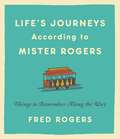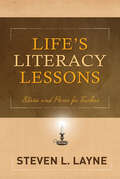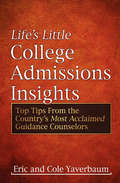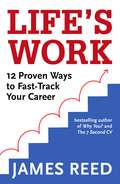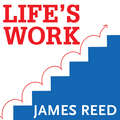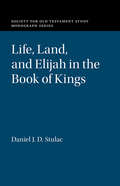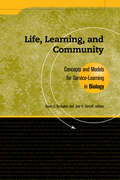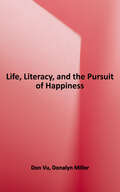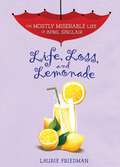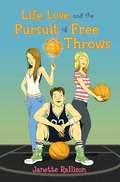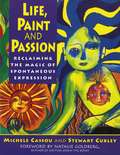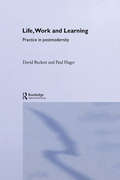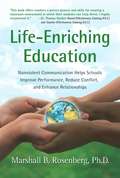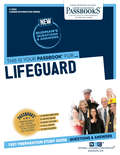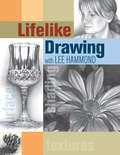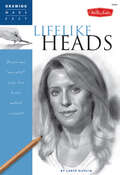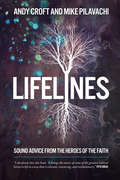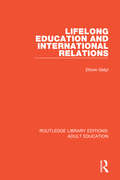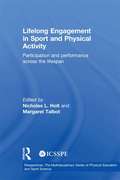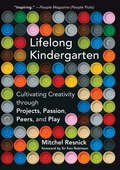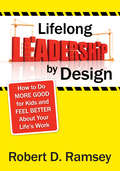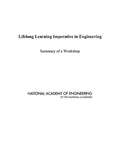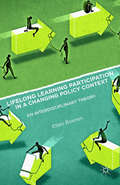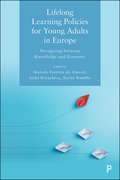- Table View
- List View
Life's Journeys According to Mister Rogers: Things to Remember Along the Way
by Fred RogersAn inspiring collection of thoughts to take with us on the paths we travel in life.For all the roads we choose to travel, and even those we don't, Fred Rogers has an observation, a story, some insights to share. Whether you're facing graduation, a new job, a new baby, marriage, any change in your life--expected or not--the wisdom that Mister Rogers offers can contribute mightily to the grace with which you handle the change.With sections titled Who You Are Right Now, Loving and Being Loved, and Guided Drift, Fred addresses the scope of human transitions. It all comes down to knowing we're valuable, and that we're worthy of that value. As Fred would say, "You don't have to be anything more than who you are right now."In her foreword, Joanne Rogers shares the Fred she knew. With stories from their life together, the joys as well as the struggles, Joanne shows how Fred looked at life as a journey--with the ups and downs and in-betweens.
Life's Literacy Lessons: Stories and Poems for Teachers
by Steven LayneThis poignant collection of stories and poems honors literacy educators for the often difficult and always essential work they do with students of all ages. A well-loved classic, Life's Literacy Lessons , is back in print by popular demand and now includes stories as well as new poems. From reading aloud to grammar, from handwriting to standards, Steven Layne highlights the tears and laughter, the challenges and rewards that inspire today's teachers. And Steven reveals his motivation-;the events, words, and thoughts that led him to capture his musings in verse and prose. Whether you read them to inspire or entertain, these delightful poems and stories are sure to capture your imagination.
Life's Little College Admissions Insights: Top Tips From the Country's Most Acclaimed Guidance Counselors
by Eric Yaverbaum Cole YaverbaumTop-of-the-class tips for starting your college search, from professional advisors and counselors. Compiled by a successful business and leadership author and his college-bound daughter, the words of wisdom in this book can jump start your collegiate research and guide you in the process as you select and apply to colleges and universities. Top experts and insiders across the country were interviewed and have given many wise and different opinions on what&’s important, based on their own firsthand experience advising hundreds of thousands of students in their careers. They were asked to provide: * the one college tip no one ever seems to know about * the first piece of advice top counselors give their own children * the one piece of advice they have given that&’s worked best * what students have to do differently today * and—to add a little education to the process—advice with an SAT word in it! Eric and Cole Yaverbaum also offer reflections on their own thought process during the search, and include invaluable informational resources such as where to look for financial aid; a detailed timeline for when to do what; test preparation information; athletics; and even the sample essay Cole used on her applications to get into college. While many adults look back on their college years as the best time of their life, no one ever seems to say the same about the college application and selection process—but this book can help make it as enjoyable and easy as possible.
Life's Work: 12 Proven Ways to Fast-Track Your Career
by James ReedThe third and final book in the REED career trilogy (after Why You? and The 7 Second CV), Life's Work is a practical, inspirational guide full of advice to help you create a fulfilling career wherever you are in life, from the UK's best-known authority on jobs and careers.'Life's Work is a candid, practical and empowering book for those looking to find meaningful work at all stages of life . . . offers unique and unexpected insights into how to build and sustain a rewarding career' - FE News'Helps young and not-so-young hopefuls get ahead' - Sunday Times By the time you retire you'll have spent a third of your life working. That's far too long to be stuck in a job you hate or even just tolerate. But where to start? Life's Work will show you 12 proven ways to fast track your career, so when you leap out of bed every Monday morning you'll be ready to take on the world. The book is written by James Reed, Chairman of REED, Britain's best-known recruitment brand. Over the past 25 years he has helped millions of people find jobs. This has given him a deep insight into what makes some people successful in building a rewarding career, while others are stuck in the confusion and frustration of not landing the job they want. Through these multiple observations and conversations, James has learned that there are 12 key ways to build and sustain the career you want. You will learn how to: · Be (sustainably) selfish · Kick start some good habits and kick out some bad ones · Think in days and decades · Be powerful, be prepared · Find a boss you can learn from Today's job landscape allows you more freedom to carve your own path than ever before. Along with this, however, comes the responsibility of shaping your mind and actions to make your career work for you. This book shows you how.'Full of ways to fast-track your career' - The Sun'Persuades you to think more deeply' - Bookbag
Life's Work: 12 Proven Ways to Fast-Track Your Career
by James ReedThe third and final book in the REED career trilogy (after Why You? and The 7Second CV), Life's Work is a practical, inspirational guide full of advice to help you create a fulfilling career wherever you are in life, from the UK's best-known authority on jobs and careers.'Life's Work is a candid, practical and empowering book for those looking to find meaningful work at all stages of life . . . offers unique and unexpected insights into how to build and sustain a rewarding career' - FE News'Helps young and not-so-young hopefuls get ahead' - Sunday Times By the time you retire you'll have spent a third of your life working. That's far too long to be stuck in a job you hate or even just tolerate. But where to start?Life's Work will show you 12 proven ways to fast track your career, so when you leap out of bed every Monday morning you'll be ready to take on the world. The book is written by James Reed, Chairman of REED, Britain's best-known recruitment brand. Over the past 25 years he has helped millions of people find jobs. This has given him a deep insight into what makes some people successful in building a rewarding career, while others are stuck in the confusion and frustration of not landing the job they want. Through these multiple observations and conversations, James has learned that there are 12 key ways to build and sustain the career you want. You will learn how to: · Be (sustainably) selfish · Kick start some good habits and kick out some bad ones · Think in days and decades · Be powerful, be prepared · Find a boss you can learn from Today's job landscape allows you more freedom to carve your own path than ever before. Along with this, however, comes the responsibility of shaping your mind and actions to make your career work for you. This book shows you how.'Full of ways to fast-track your career' - The Sun'Persuades you to think more deeply' - Bookbag
Life's Work: 12 Proven Ways to Fast-Track Your Career
by James ReedThe third and final book in the REED career trilogy (after Why You? and The 7 Second CV), Life's Work is a practical, inspirational guide full of advice to help you create a fulfilling career wherever you are in life, from the UK's best-known authority on jobs and careers.'Life's Work is a candid, practical and empowering book for those looking to find meaningful work at all stages of life . . . offers unique and unexpected insights into how to build and sustain a rewarding career' - FE News'Helps young and not-so-young hopefuls get ahead' - Sunday Times By the time you retire you'll have spent a third of your life working. That's far too long to be stuck in a job you hate or even just tolerate. But where to start? Life's Work will show you 12 proven ways to fast track your career, so when you leap out of bed every Monday morning you'll be ready to take on the world. The book is written by James Reed, Chairman of REED, Britain's best-known recruitment brand. Over the past 25 years he has helped millions of people find jobs. This has given him a deep insight into what makes some people successful in building a rewarding career, while others are stuck in the confusion and frustration of not landing the job they want. Through these multiple observations and conversations, James has learned that there are 12 key ways to build and sustain the career you want. You will learn how to: · Be (sustainably) selfish · Kick start some good habits and kick out some bad ones · Think in days and decades · Be powerful, be prepared · Find a boss you can learn from Today's job landscape allows you more freedom to carve your own path than ever before. Along with this, however, comes the responsibility of shaping your mind and actions to make your career work for you. This book shows you how.'Full of ways to fast-track your career' - The Sun'Persuades you to think more deeply' - Bookbag
Life, Land, and Elijah in the Book of Kings (Society for Old Testament Study Monographs)
by Daniel J. StulacIn this book, Daniel J. D. Stulac brings a canonical-agrarian approach to the Elijah narratives and demonstrates the rhetorical and theological contribution of these texts to the Book of Kings. This unique perspective yields insights into Elijah's iconographical character (1 Kings 17-19), which is contrasted sharply against the Omride dynasty (1 Kings 20-2 Kings 1). It also serves as a template for Elisha's activities in chapters to follow (2 Kings 2-8). Under circumstances that foreshadow the removal of both monarchy and temple, the book's middle third (1 Kings 17-2 Kings 8) proclaims Yhwh's enduring care for Israel's land and people through various portraits of resurrection, even in a world where Israel's sacred institutions have been stripped away. Elijah emerges as the archetypal ancestor of a royal-prophetic remnant with which the reader is encouraged to identify.
Life, Learning, and Community: Concepts and Models for Service Learning in Biology
by David C. Brubaker Joel H. OstroffThis book represents the 18th of AAHE’s series on service-learning in the disciplines and focuses on service-learning strategies and models in biology. Although, there are obvious applications for service-learning in such fields as nursing and teacher education, incorporating it into natural science courses has not always seemed practical to science instructors. This book not only provides strong arguments for using service-learning in biology courses but also gives real life examples of how it has been successfully used in biology curricula.
Life, Literacy, and the Pursuit of Happiness: Supporting Our Immigrant and Refugee Children Through the Power of Reading
by Don Vu'Life, Literacy, and the Pursuit of Happiness' is the first professional title dedicated to addressing a school’s reading culture with a focus on the needs of immigrant and refugee students and families―including learning their target language, English. Dr. Vu presents the six conditions of culture that are informed by the research―Commitment, collection, clock, conversation, connection, and celebration―that create a school environment where immigrant and refugee students can thrive. Additionally, Dr. Vu provides practical strategies that most effectively support students who are new to this country.
Life, Loss, and Lemonade (The Mostly Miserable Life of April Sinclair #8)
by Laurie FriedmanAs freshman year winds down, April has a lot to look forward to, including getting her driving permit and spending the summer with her quirky almost-boyfriend, Leo. But she also knows her grandmother, Gaga, doesn't have much time left. On top of that, her closest friend, Sophie, is moving away. April struggles to make sense of everything. Does it matter if you stay positive while losing a loved one to cancer? What do you do when you're caught between friends keeping secrets? How do you know whether an important decision is the right one? Most importantly, what would Gaga say to do when life hands you lemons?
Life, Love, and the Pursuit of Free Throws
by Janette RallisonHigh school freshmen Josie and Cami try to remain best friends as they compete for basketball awards and boys.
Life, Paint and Passion: Reclaiming the Magic of Spontaneous
by Michele Cassou Stewart CubleyLife, Paint And Passion is a deeply involving approach to using the creative process as a tool for self-discovery. With vibrant and contagious enthusiasm, the authors liberate the reader's urge to create freely and spontaneously, as a painter or an artist in another medium, purely for the process of exploration, not for result.With eloquence and simplicity, the authors encourage the reader to journey inward toward his or her authentic self and discover the unique intuition awaiting there. It is this intuition that provides all the tools the reader needs to crumble the barrier between the innermost self and its uncensored manifestation.Through lively interviews with students, the authors explore painting as a practice that facilitates the ecstasy of unfettered expression. With simple brushes, a few dishes of paint, and this book, the reader will be able to coax the hidden self out of the heart and onto a paper.Life, Paint And Passion is the result of nearly thirty years of intensive work with the painting process. It provides powerful insights into the act of creation, a solid base for facing and transcending creative blocks, and brings fresh perceptions and healing to life.
Life, Work and Learning (Routledge International Studies in the Philosophy of Education)
by Paul Hager David BeckettIn both paid and unpaid work contexts adults learn powerfully from their experiences. In this book, the authors argue that this should be the basis for a new perception of what is truly educational in life. Drawing on the works of Aristotle, Wittgenstein and Russell, along with contemporary conceptual work, they use both philosophical argument and empirical example to establish their view.This work will be of essential interest to philosophers of education and educational theorists worldwide. It will also interest teachers, trainers, facilitators, and all those with an interest in adult and vocational education.
Life-Enriching Education: Nonviolent Communication Helps Schools Improve Performance, Reduce Conflict, and Enhance Relationships
by Riane Eisler Marshall B. RosenbergAddressing the need for a dynamic change in the formula schools use to mold their students, this groundbreaking guide provides a new approach to education that serves the lives of everyone in the learning community. By implementing the unique communication skills outlined, educators can promote cooperation and understanding and address many of the complex problems faced in the classroom. Teachers will learn new skills to increase student interest, achievement, and retention, as well as create a safe and supportive learning and working atmosphere. They are also given strategies for cultivating emotional intelligence, respect, authenticity, and empathy and are empowered to resolve conflict and prevent or defuse violence. The end result helps teachers rediscover the joy of teaching motivated students.
Lifeguard: Passbooks Study Guide (Career Examination Series)
by National Learning CorporationThe Lifeguard Passbook® prepares you for your test by allowing you to take practice exams in the subjects you need to study. It provides hundreds of questions and answers in the areas that will likely be covered on your upcoming exam.
Lifelike Drawing With Lee Hammond: Create Lifelike Portraits, Pets, Landscapes And More
by Lee HammondThe queen of drawing instruction shows readers exactly how to make their work more lifelike and realistic. Even complete beginners can get fast results!
Lifelike Heads: Discover Your Inner Artist As You Learn To Draw Portraits In Graphite (Drawing Made Easy)
by Lance RichlinLearn to draw amazingly realistic portraits in seven easy stages—from capturing unique facial features and expressions to different ages and races. This book is the perfect guide for creating lifelike representations of the human head in graphite. Experienced artist Lance Richlin begins by explaining drawing tools and materials, shading techniques, and the important anatomical structures of the head. Following these basics, he shows how to light the subject, block in and render each feature of the face, and address a variety of expressions—from subtle smiles to toothy grins. Then he guides the reader through four impressive projects, showing how to develop a lifelike head drawing in seven simple stages: the lay-in, plumb lines, volume, outline, tonal pattern, value, and finishing. Readers also will find an in-depth troubleshooting section to help them identify and solve any problems that lessen the realism and accuracy of their drawings. In an age full of technological shortcuts, this book emphasizes drawing from life and seeks to preserve the methods of the old masters.
Lifelines: Sound Advice from the Heroes of the Faith
by Mike Pilavachi Andy CroftWhat if, during a battle with fear, we could take some tips from David? Or in wrestling with a relationship, we could learn from Ruth? Or when we’ve got questions about the future, we could sit down with Joseph? Through their successes, struggles, and failures, these men and women of faith have blazed a trail for us to follow. We can walk beside them and discover God with them. Their stories took place thousands of years ago, but what their lives teach us has never mattered more. Much of what we learn comes from the people we live with. We see and share their worlds and, without realizing it, are shaped by them. What would it be like if we could share in the lives of the great heroes of the faith? In Lifelines, Mike Pilavachi and Andy Croft help us understand what the stories of these biblical characters have to teach us about how to live lives full of faith and integrity today.
Lifelong Education and International Relations (Routledge Library Editions: Adult Education)
by Ettore GelpiOriginally published in 1985, this book argues that lifelong education has a vital part to play in fostering international political understanding. It also demonstrates how educational planners can use the concept of lifelong education to deal with some of the contradictions inherent in much of the educational system in the industrialised world. There is a case study from Japan and China and chapters on the role of culture, migration and labour mobility.
Lifelong Engagement in Sport and Physical Activity: Participation and Performance across the Lifespan (ICSSPE Perspectives)
by Margaret Talbot Nicholas L. HoltSport and physical activity should now be understood as lifelong activity, beginning in childhood, and accessible to participants of all levels of ability. This book offers an overview of some of the core concerns underlying lifelong engagement in sport and physical activity, encompassing every age and phase of engagement. The book explores key models of engagement from around the world, as well as specific areas of research that will help the reader understand this important topic. In adopting a lifespan approach, the book pays particular attention to sport and physical activity during childhood and adolescence as well as transitions into adulthood, the developmental periods when participation in sport and physical activity are most likely to decline. Understanding more about participation during these early years is important for sustaining participation during adulthood. The book also addresses issues relating to sport and physical activity during adulthood, across a range of different populations, while a final section examines sport and physical activity among older adults, an often overlooked, but growing segment of society in this context. Lifelong Engagement in Sport and Physical Activity is important reading for undergraduate and postgraduate students in teacher education, sport and coaching science, and for health promoters, coaches, teachers and relevant bodies and organizations in sport and education. This book is published in partnership with ICSSPE, and is part of the Perspectives series
Lifelong Kindergarten: Cultivating Creativity through Projects, Passion, Peers, and Play (The\mit Press Ser.)
by Mitchel ResnickHow lessons from kindergarten can help everyone develop the creative thinking skills needed to thrive in today's society.In kindergartens these days, children spend more time with math worksheets and phonics flashcards than building blocks and finger paint. Kindergarten is becoming more like the rest of school. In Lifelong Kindergarten, learning expert Mitchel Resnick argues for exactly the opposite: the rest of school (even the rest of life) should be more like kindergarten. To thrive in today's fast-changing world, people of all ages must learn to think and act creatively—and the best way to do that is by focusing more on imagining, creating, playing, sharing, and reflecting, just as children do in traditional kindergartens.Drawing on experiences from more than thirty years at MIT's Media Lab, Resnick discusses new technologies and strategies for engaging young people in creative learning experiences. He tells stories of how children are programming their own games, stories, and inventions (for example, a diary security system, created by a twelve-year-old girl), and collaborating through remixing, crowdsourcing, and large-scale group projects (such as a Halloween-themed game called Night at Dreary Castle, produced by more than twenty kids scattered around the world). By providing young people with opportunities to work on projects, based on their passions, in collaboration with peers, in a playful spirit, we can help them prepare for a world where creative thinking is more important than ever before.
Lifelong Leadership by Design: How to Do More Good for Kids and Feel Better About Your Life's Work
by Robert D. RamseyOffering practical advice for education leaders at all levels, this essential guide helps readers build a dynamic career by design—not by default—and leave a lasting legacy.
Lifelong Learning Imperative in Engineering: Summary of a Workshop
by National Academy of Enegineering National of the National AcademiesThe 21st century is witnessing a rapid increase in the pace of knowledge creation in the sciences and engineering. Competing in this global economy requires a science and engineering workforce that is consistently at the technological forefront. Dr. Charles Vest, President of the National Academy of Engineering, in a speech at the University of Michigan on October 15, 2007, put it simply: prospering in the knowledge age requires people with knowledge. The purpose of the Lifelong Learning Imperative Workshop, summarized in this volume, was to consider learning opportunities for the engineering professional. The participants in the workshop addressed the necessity of lifelong learning, the history of continuing education, possible delivery systems, systems used by other professions, and the current state of learning when viewed in the light of the rapid rate of technological change.
Lifelong Learning Participation in a Changing Policy Context: An Interdisciplinary Theory
by Ellen BoerenDrawing on the role of individuals, education and training providers and countries' social policy actions, and borrowing insights from psychology, sociology and economics, this book works towards an interdisciplinary theory of adult lifelong learning participation. It explores the fragmented evidence of why adults do or do not participate in adult lifelong learning activities and focuses on the relevance of policy, the social character and expected benefits of lifelong learning participation and discusses the potential implications for policy, practice and research.
Lifelong Learning Policies for Young Adults in Europe: Navigating between Knowledge and Economy
by Marcelo Parreira do Amaral, Siyka Kovacheva & Xavier RamblaAvailable Open Access under CC-BY-NC licence. This comprehensive collection discusses topical issues essential to both scholarship and policy making in the realm of lifelong learning (LLL) policies and how far they succeed in supporting young people across their life courses, rather than one-sidedly fostering human capital for the economy. Examining specific yet diverse regional and local contexts across Europe, this book uses original research to evaluate differences in scope, approach, orientation, and objectives. It examines the embedding of LLL policies into the regional economy, the labour market, education and training systems and the individual life projects of young people, with a focus on those in situations of near social exclusion.
